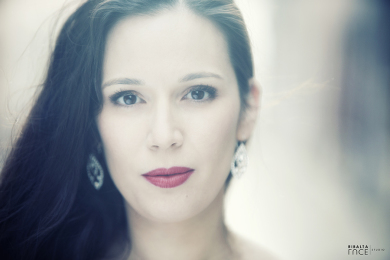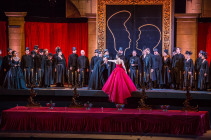Biography
Born in Albi, France, Gabrielle Philiponet was a flutist and cellist before studying the voice with Daniel Ottevaere. As a member of the Opera Studio of the Chapelle Musicale Reine Elisabeth in Brussels, she was a prize winner at the prestigious Reine Elisabeth Competition.
Closely associated with the French repertoire, Gabrielle debuted at the Opéra de Paris with Frasquita (Carmen, Bizet), a role she also interpreted for the Bayerische Staatsoper and Aix-en-Provence Festival. She appeared as Micaëla in Metz, Massy and Lille, and was Leïla (Les Pêcheurs de Perles, Bizet) at the Opéra de Lille and Opéra de Nice. She made her debut as the title role of Gounod's Mireille at Opera de Metz and sings Marguerite (Faust, Gounod) at Opéra de Saint-Etienne, Limoges and Vichy. She sang Lalla-Roukh's title-role by F. David for the Wexford Festival Opera. She performed Antonia and Stella (Les Contes d'Hoffman, Offenbach) after Massenet’s Cendrillon for both La Monnaie in Bruxelles and Gand Théâtre de Luxembourg, and L’Enfant et les sortilèges by Ravel with the Symphonic Orchestra of Montréal. She sang Plautine (Le Temple de la Gloire, Rameau) with the Philharmonia Baroque Orchestra of San Francisco.
More recently, György Vashegyi invited her for Lilia (Herculanum, F. David) with the Hungarian National Philharmonic Orchestra in Budapest, and the french composer, Bruno Mantovani entrusted her with the world premiere of Amours, his first song cycle for voice and piano based on the poems of renaissance poet Etienne Jodelle, at Capitole de Toulouse.
Gabriella has worked with conductors such as Kent Nagano, Pablo Heras-Casado, Lorenzo Viotti, Roberto Rizzi-Brignoli, Alain Altinoglu, Karel Mark Chichon, David Reiland, Andreas Spering, Hervé Niquet, Roland Böer, Laurent Campellone, Giuseppe Grazioli, Roberto Forés-Veses and Paul Goodwin.
She regularly appears in leading roles from the romantic operatic Italian repertoire : first with Puccini in Magda
(La Rondine) at Nancy Opera and Lauretta (Gianni Schicchi) with the Belgian National Orchestra at the Bruxelles Palais des Beaux-Art, Mimi in La
Bohème in Spain and was Musetta in the same opera in Marseille, Metz, Massy and for “Musiques en fête” at Chorégies d’Orange which was broadcast live on France
3 (TV) and on France Musique (radio).
Faithful to the verdian roles, she embodied her signature role of Violetta (La Traviata) in Paris, New Orleans, Massy, among other cities, Oscar (Ballo in Maschera) at
Massy, Desdemona (Otello) in Saint-Etienne Opera and Alice Ford (Falstaff) at the Opera de Lille.
She mastered Adina (L’Elisir d’amore, Donizetti) at the Toulouse and
Nice Operas, Corinna (Il viaggio a Reims, Rossini) in Bordeaux,
Toulouse, Nice, Marseille, Montpellier, Nancy and Vichy.
Other career highlights include the Mozart roles of Donna Anna (Don Giovanni) at Angers-Nantes Opera and Grand Avignon Opera, Fiordiligi (Così fan tutte) at the Opéra de Rouen and Susanna (Le Nozze di Figaro) at Nancy Opera.
Also on stage as an interpreter of operetta, Gabrielle starred as Rosalinde in J. Strauss’ Fledermaus at Opéra Grand Avignon, and as Lisa in Lehár’s Das Land des Lächelns at Opéra de Tours. Earlier in her career, she brought to life light Offenbach roles including La Princesse Hermia (Barbe-Bleue) at Angers-Nantes Opera and the Opéra de Rennes, Gabrielle (La Vie parisienne) at the Opéra de Toulon, Eurydice (Orphée aux Enfers) at the Opéra de Montpellier and Rosita (Un Mari à la porte) with the Royal Liverpool Philharmonic Orchestra.
In the field of sacred music, we heard her in Rossini’s Stabat Mater and Poulenc’s Sept répons des ténèbres, both with the Orchestre National de Lille, in Gabriel and Eva in The Creation by Haydn for the Clermont-Ferrand Orchestra, in Rossini's Petite Messe Solennelle at Stresa and Vezelay, in Dvorak's Stabat Mater, in Mozart's Ut Minor's Mass and finally in the Beethoven's 9th Symphony with Lyon National Orchestra conducted by Ben Glassberg.
October 2023


